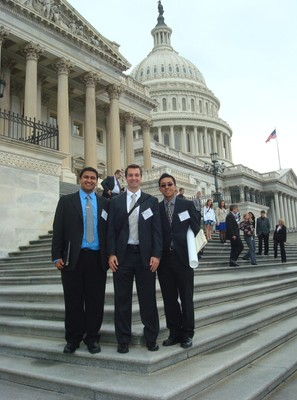A duo of UCLA electrical engineering seniors were one of only 60 student groups nationwide to participate in the prestigious Posters on the Hill program, held by the Council on Undergraduate Research. The organization promotes high-quality undergraduate student-faculty collaborative research and scholarship and counts more than 900 college and universities as its members.
For the past two years, Carlo Paredes and Neal Shah have been conducting microfluidic research under the guidance of electrical engineering assistant professor Robert N. Candler. The group has developed customizable components to make the transfer of fluids to lab-on-a-chip devices much easier, more consistent, as well as less expensive.
In April the two students and Candler went to Washington, D.C. to present their poster. Their tour included stops at a few offices of California congressional delegation, including Congressman Henry Waxman (CA-30) and Congressman Pete Stark (CA-13), who they both met personally, as well as top aides to Senators Dianne Feinstein and Barbara Boxer; Congresswoman Judy Chu (CA-32), and Congresswoman Karen Bass (CA-33).
“It was great speaking to people who were genuinely interested in our research,” Paredes said. “To be mores specific, my favorite part was fielding questions about the device and subsequently hearing an, ‘Oh, that’s cool,’ followed by a look of interest.”
 Shah and Paredes were also the only engineering students from University of California system to attend the program. UCLA also had another student, Ilona Gerbakher, a Middle Eastern and North African studies student, who was just one of 14 total students in the humanities to participate in the nationwide program.
Shah and Paredes were also the only engineering students from University of California system to attend the program. UCLA also had another student, Ilona Gerbakher, a Middle Eastern and North African studies student, who was just one of 14 total students in the humanities to participate in the nationwide program.
Paredes and Shah first became interested in undergraduate research opportunities in their sophomore year through Candler’s regular coffee hours for students. Paredes had already attended a few and became interested in research.
“I went, we talked for a bit, and near the end I asked about research opportunities in his lab,” Paredes said. “He told me about a special project he had in mind, and the rest is history.”
For Shah the experience was similar.
“We got interested in one of the ideas he had for us, and finding out that we would be able to work on this research for more than a couple quarters really interested both of us,” Shah said.
Candler is an expert in micro- and nano-scale technologies. He wanted to develop an inexpensive, yet durable and customizable fluid interface for lab-on-a-chip devices, which can conduct lab tests on thumbnail-sized platforms. However getting the sample fluids onto the devices can be difficult and expensive. Their new type of devices solve this by acting as a very precise intermediary between a syringe carrying the fluid and the lab-on-a-chip device that will analyze the sample.
“We envision these microfluidic interconnects being used in resource-limited settings, such as developing nations and military outposts, where access to medical equipment and even trained medical professionals may be severely limited,” Candler said.
Paredes performed the design and fabrication of the prototypes, Shah designed and executed testing.
“Carlo and Neal are two of the many excellent undergraduate students who take advantage of the research opportunities available at UCLA,” Candler said. “Their work, funded by the National Science Foundation, not only allowed them to get hands on laboratory experience, they also were able to work on a research project with potential impact in medicine and MEMS, their chosen fields.”
Eventually, these devices could be produced on site as needed at medical facilities as 3-D printing technology becomes more ubiquitous, Candler said.
After UCLA, Paredes, who is finishing up his bachelor’s degree next year, said he plans to work in industry, possibly specializing in microfluidics, micro-electromechanical systems (MEMS), or nanotechnology. Shah graduated in June and will be attending medical school in the fall.
